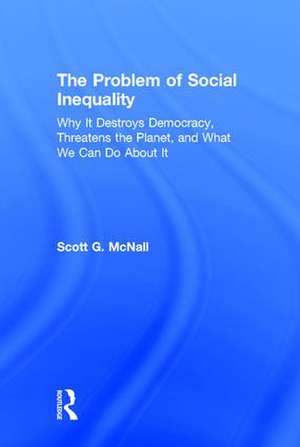The Problem of Social Inequality: Why It Destroys Democracy, Threatens the Planet, and What We Can Do About It
Autor Scott G. McNallen Limba Engleză Hardback – 11 dec 2015
| Toate formatele și edițiile | Preț | Express |
|---|---|---|
| Paperback (1) | 388.26 lei 6-8 săpt. | |
| Taylor & Francis – 21 dec 2015 | 388.26 lei 6-8 săpt. | |
| Hardback (1) | 1114.08 lei 6-8 săpt. | |
| Taylor & Francis – 11 dec 2015 | 1114.08 lei 6-8 săpt. |
Preț: 1114.08 lei
Preț vechi: 1358.64 lei
-18% Nou
Puncte Express: 1671
Preț estimativ în valută:
213.18€ • 232.29$ • 179.63£
213.18€ • 232.29$ • 179.63£
Carte tipărită la comandă
Livrare economică 23 aprilie-07 mai
Preluare comenzi: 021 569.72.76
Specificații
ISBN-13: 9781138959712
ISBN-10: 1138959715
Pagini: 316
Ilustrații: 6
Dimensiuni: 152 x 229 x 19 mm
Greutate: 0.59 kg
Ediția:1
Editura: Taylor & Francis
Colecția Routledge
Locul publicării:Oxford, United Kingdom
ISBN-10: 1138959715
Pagini: 316
Ilustrații: 6
Dimensiuni: 152 x 229 x 19 mm
Greutate: 0.59 kg
Ediția:1
Editura: Taylor & Francis
Colecția Routledge
Locul publicării:Oxford, United Kingdom
Public țintă
Postgraduate and UndergraduateCuprins
Chapter 1. The Nature of Social Inequality..
Chapter 2. A World Divided by Income and Wealth.
Chapter 3. Capitalism and Social Inequality.
Chapter 4. The Continuing Crises of Capitalism.
Chapter 5. Trust, Inequality, and Democracy.
Chapter 6. Corruption and Social Inequality.
Chapter 7. Narratives of Power: How They Drive Social Inequality.
Chapter 8. Rebooting Capitalism to Create a Resilient Future.
Chapter 2. A World Divided by Income and Wealth.
Chapter 3. Capitalism and Social Inequality.
Chapter 4. The Continuing Crises of Capitalism.
Chapter 5. Trust, Inequality, and Democracy.
Chapter 6. Corruption and Social Inequality.
Chapter 7. Narratives of Power: How They Drive Social Inequality.
Chapter 8. Rebooting Capitalism to Create a Resilient Future.
Recenzii
"Scott McNall has written a lucid, comprehensive, and compelling account of economic inequality, its intersections with other forms of social inequality, and the threats it poses to democracy and the planet. His recommendations for reforming the current neoliberal capitalist regime suggest a sustainable path to a more democratic future."
—Robert J. Antonio, Professor of Sociology, University of Kansas
"Scott McNall's book moves effortlessly from big-picture to ground-level issues as he assesses the entrenched nature of inequalities. This readable treatments helps student readers see how Marx and Weber can illuminate their own struggles to pay for college, find jobs, establish relationships, and escape or avoid debt. McNall strikes exactly the right tone as he patiently excavates the global from the local. His brand of applied critical theory works."
—Ben Agger, Professor of Sociology and Humanities and Director, Center for Theory, University of Texas at Arlington
"McNall provides a sophisticated analysis of growing degrees of inequality in the world, as well as its causes, consequences, and solutions. As one's life chances are increasingly determined by irrelevant moral criteria such as gender, ethnicity, religion and family, the trust on which a democracy depends is quickly eroded. The book offers a wise and plausible message for success: create high levels of human capital. By joining together the issues of climate change, social inequality, corruption, trust and democracy, McNall offers the beginnings of a road map to a much improved world."
—Tom Kando, Professor Emeritus of Sociology, Sacramento State University
"The Problem of Social Inequality provides essential insights into the causes of social inequality and why inequality serves as a major barrier in creating a sustainable and resilient future. The author argues that we need to reboot capitalism by maximizing human talent and creativity in order to adapt to an unknown future. For students and practitioners this work is a significant contribution to discussions about global progress and should be required reading in both the social and environmental sciences."
—Jim Pushnik, Director of the Institute for Sustainable Development at California State University, Chico
"At a time when inequality has become the catchword for all that ails the globalized world, we are nevertheless ignorant of its sources, dynamics, and consequences. McNall’s book is the go to text for redressing these grievous inadequacies in current scholarship. Its central virtue is in pushing well behind the parochial fixation on income differentials. Instead he views equality in all its various dimensions—and especially the catastrophic causal consequences of the drastic imbalance in political power at local, national and global level, the consequently lethal mal-distribution of health care and material well-being, and the often unobserved but brutal consequences of cultural inequality. And, within this, McNall harnesses his global focus to underscore, diagnose, and analyze the less-than-mediocre performance of the United States in addressing these issues within our national boundaries."
—Michael Schwartz, Distinguished Professor of Sociology, Stony Brook University
—Robert J. Antonio, Professor of Sociology, University of Kansas
"Scott McNall's book moves effortlessly from big-picture to ground-level issues as he assesses the entrenched nature of inequalities. This readable treatments helps student readers see how Marx and Weber can illuminate their own struggles to pay for college, find jobs, establish relationships, and escape or avoid debt. McNall strikes exactly the right tone as he patiently excavates the global from the local. His brand of applied critical theory works."
—Ben Agger, Professor of Sociology and Humanities and Director, Center for Theory, University of Texas at Arlington
"McNall provides a sophisticated analysis of growing degrees of inequality in the world, as well as its causes, consequences, and solutions. As one's life chances are increasingly determined by irrelevant moral criteria such as gender, ethnicity, religion and family, the trust on which a democracy depends is quickly eroded. The book offers a wise and plausible message for success: create high levels of human capital. By joining together the issues of climate change, social inequality, corruption, trust and democracy, McNall offers the beginnings of a road map to a much improved world."
—Tom Kando, Professor Emeritus of Sociology, Sacramento State University
"The Problem of Social Inequality provides essential insights into the causes of social inequality and why inequality serves as a major barrier in creating a sustainable and resilient future. The author argues that we need to reboot capitalism by maximizing human talent and creativity in order to adapt to an unknown future. For students and practitioners this work is a significant contribution to discussions about global progress and should be required reading in both the social and environmental sciences."
—Jim Pushnik, Director of the Institute for Sustainable Development at California State University, Chico
"At a time when inequality has become the catchword for all that ails the globalized world, we are nevertheless ignorant of its sources, dynamics, and consequences. McNall’s book is the go to text for redressing these grievous inadequacies in current scholarship. Its central virtue is in pushing well behind the parochial fixation on income differentials. Instead he views equality in all its various dimensions—and especially the catastrophic causal consequences of the drastic imbalance in political power at local, national and global level, the consequently lethal mal-distribution of health care and material well-being, and the often unobserved but brutal consequences of cultural inequality. And, within this, McNall harnesses his global focus to underscore, diagnose, and analyze the less-than-mediocre performance of the United States in addressing these issues within our national boundaries."
—Michael Schwartz, Distinguished Professor of Sociology, Stony Brook University
Notă biografică
Scott G. McNall is Emeritus Provost and Professor at California State University (CSUC), Chico and currently an affiliated Professor in the Department of Sociology at the University of Montana. He was the founding Executive Director of the Institute for Sustainable Development at CSUC. He lives with his wife, Sally, in Missoula, Montana.
Descriere
Within and among nations, rising levels of social inequality threaten our collective future. Currently, upwards of 80% of people’s life chances are determined by factors over which they have absolutely no control. Social inequality threatens the democratic project because it destroys the trust on which governments depend, and it gives rise to corrupt political and economic institutions. How can we get out of the traps we have created for ourselves? We need to reboot capitalism. Drawing on diverse examples from a range of countries, McNall explains the social, economic, and ecological traps we have set for ourselves and develops a set of rules of resilience that are necessary conditions for the creation and maintenance of democratic societies, and a set of rules essential for creating a sustainable future.













